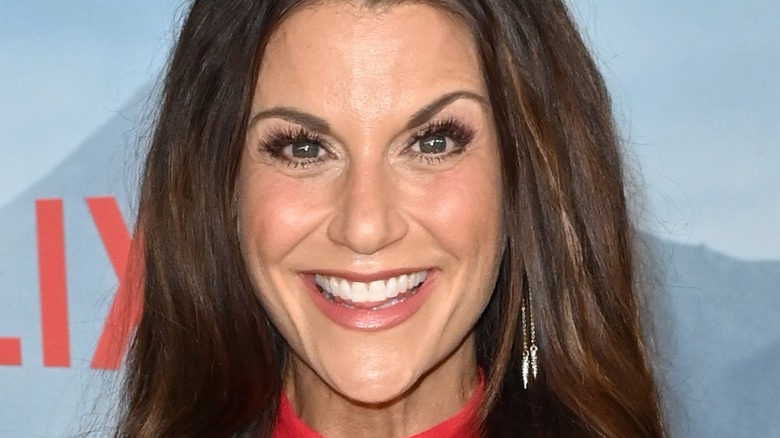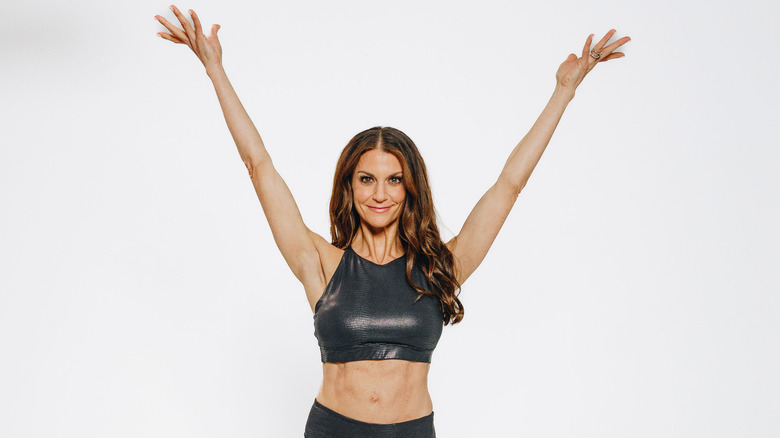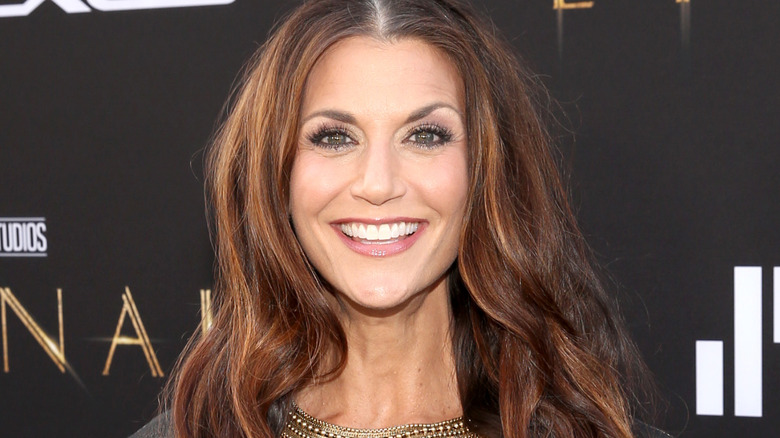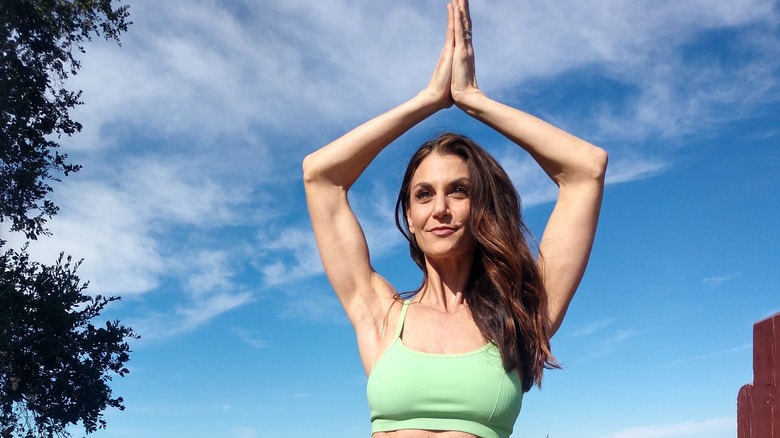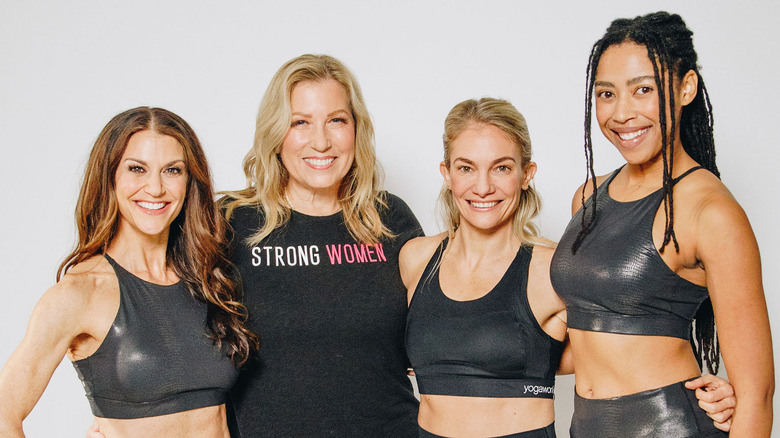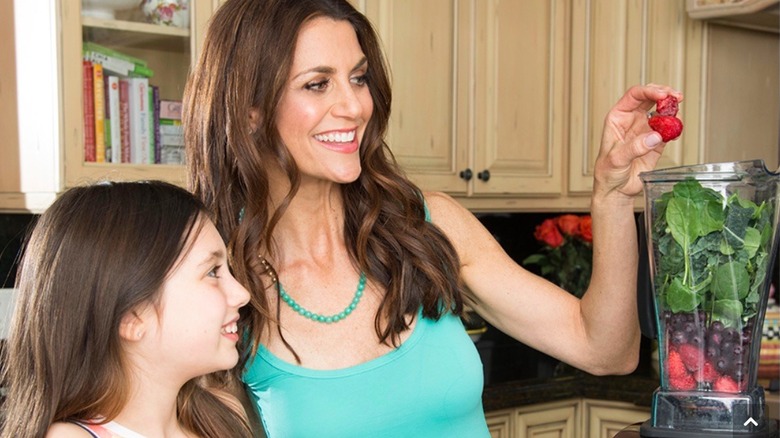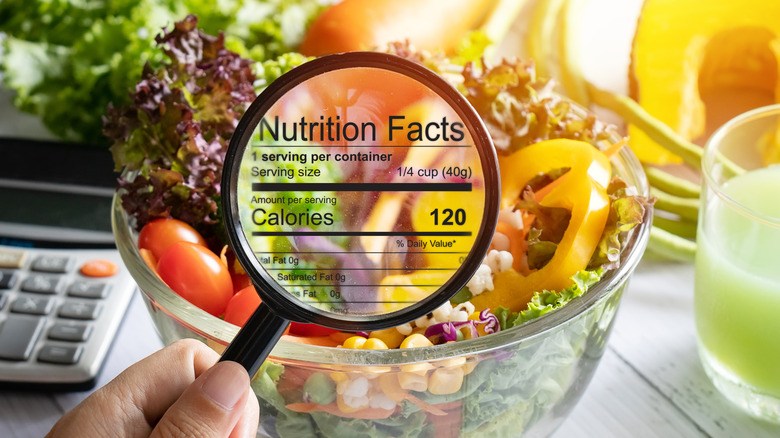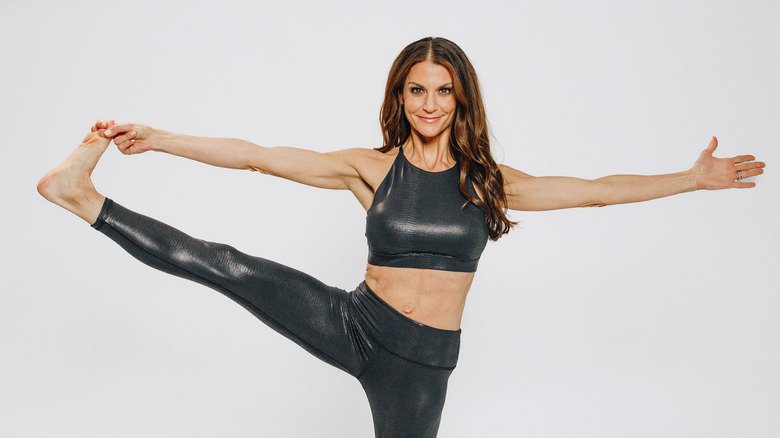Samantha Harris Teams Up With YogaWorks To Support The Breast Cancer Community - Exclusive Interview
Samantha Harris was used to living her life full-throttle. While you might know her best as co-host on "Dancing with the Stars," she's been an Emmy award-winning anchor and reporter for entertainment shows such as "Entertainment Tonight" and "E! News" (via IMDb). Her life took a sudden detour when she learned she had breast cancer just after she turned 40. This surprised her, especially since most breast cancer diagnoses occur in women over 50, according to the Centers for Disease Control and Prevention.
Harris now works with Susan G. Komen to raise awareness about what women can do to reduce the toxins — including toxic relationships — that cause stress on the body. Harris now serves as the ambassador for YogaWorks Pink, which is a partnership between Komen and YogaWork's online studio platform. The online platform offers mind-body classes specifically tailored for women who are in treatment or recovery from breast cancer. In an exclusive interview with Health Digest, Harris opened up about how her cancer diagnosis launched her into a new career as a wellness advocate.
How Samantha learned about her breast cancer diagnosis
This is a collaboration with YogaWorks called YogaWorks Pink. This is obviously personal to you because you were diagnosed with breast cancer at a relatively young age — talk to me about your breast cancer journey.
I was about to turn 40, and I was in the best shape of my life, or so I thought — as healthy as could be. My dad died of colon cancer when he was just 50. His mom was a breast cancer survivor — lived to 95 — but my daughters were 3 and 6. I thought I should get one of those mammogram things — "Let's set a baseline since I'm so darn healthy right now."
The results came back clear, which is what I had assumed they would. 11 days later, I found a lump. But that's not even the craziest part of the story; it gets crazier because I found a lump, I immediately went to see my long-term OB-GYN, and she quickly did a clinical exam and said it was nothing. I took her at her word because she was always a non-alarmist and my most trusted doctor, and she sent me on my way.
A month later, that lump was still there, and I thought I should maybe get a second opinion, never thinking it was cancer, so I went to see my internist. He did a quick exam, felt around, said it was nothing, sent me on my way. Four months later, I finally listened to that inner voice of mine that was now screaming at me. I realized that sometimes, we have to get quiet with ourselves and listen to that gut instinct, or as I like to say, the inner voice. It was saying, "Samantha, if this truly is nothing, and you're going to live with this lump that is nothing for the rest of your life, shouldn't we maybe look a little more in-depth? Shouldn't you see an expert who looks at breasts every day as their specialty?"
I went to see an oncologist — again, not thinking for a moment that I had cancer. She did not think I had cancer. She did a needle biopsy, two ultrasounds, and even a subsequent MRI. Not one of the tests detected the cancer. Yet she thankfully listened to her gut and said, "I don't know what it is, so I'm going to suggest we take it out," which we did. [I] woke up from a lumpectomy and again, [was] reassured it's not cancer. Then when we got the final pathology about a week later, we found that yes, it actually is DCIS, which is ductal carcinoma in situ contained within the duct, but it was also invasive breast cancer.
My life on a dime changed, and my cancer journey began. There I was with, "Okay, now where do I go? How do I find treatment? How do I find the resources? Which treatment should I do? Which surgery should I do?" Eventually, I opted for a double mastectomy with two-stage reconstruction ... I'm really grateful for that choice; that's what I needed to do to get through and beyond. I also found that it went to a lymph node and I was quickly re-staged at stage two.
How cancer changed her life
How did your cancer diagnosis change your life?
I was baffled by the fact that of one in eight women who will be diagnosed with invasive breast cancer over the course of her lifetime, only 5% to 10% of those are actually genetic. To me, that was the most shocking. Here I was with a father and a grandmother who had cancer, and yet I had no genetic link. It befuddled me. As a journalist, I needed to research and find out answers. I went on a deep dive, and I determined it is what we put in, on, and around our bodies that affect our overall well-being. It is a matter of whether or not we have time to sit with ourselves, be mindful, mitigate stress, and reduce toxic relationships.
All of those things coming into play affect whether or not those DNA strands that might be leaning toward a predisposition to disease — whether it's cancer, Type II diabetes, or heart disease — can be switched on or off. Epigenetic factors make a difference in how we choose to live our lifestyles. That was the biggest turning point in my cancer journey. It was also one of the most liberating and enthralling parts of it, because I realized I am in much more control of my health and well-being than I ever knew was possible. Once I learned all of that, actually, cancer also changed the trajectory of my career.
I'm not stepping away completely from TV hosting, but when I had cancer and came out to the other side after my year-plus of getting back to who I was and my healthiest self possible, I realized I needed to make changes. I thought I was healthy. I was the healthy one among my friends and family. Then I realized I needed to become my healthiest healthy. In doing that, I needed to reassess. How was I working out? What was my approach to exercise, to nutrition? I sat in a makeup chair being shellacked with chemical bombs of endocrine disruptors and carcinogens for years, not knowing what was going on in my body, not having any awareness.
I did not understand the importance or even that I could manage stress or reduce the amount of the go-go-go, constant, nonstop world that I lived in. When I started to make these changes for myself, I realized I needed to become my healthiest healthy. That's when I wrote my book, "Your Healthiest Healthy." The goal is to get the word out to people that we can take even better control of our bodies than we may think we can or are even able to.
I went back to school after my breast cancer diagnosis, and after writing my book, I became a certified health coach. Yes, I still live in the world of TV hosting, but the majority of my life, my time, my dedication, and my passion is in the wellness world.
How yoga helped her connect mind and body
How have yoga and mindfulness helped you in dealing with these challenges, not only through the original diagnosis but also getting through that recovery period?
I realized I was exercising specifically for extrinsic reasons. I wanted to look good in a dress on TV. I wanted to look strong and muscular and sculpted when I stood next to those dancers on "Dancing with the Stars" when I hosted for all those seasons.
That wasn't a great reason to be exercising. When I started to revamp and completely turn on its head all of my reasoning for exercise, it became, "What can my body do for me? How can my one vessel that I'm living in carry me through what I hope now will be a very long life ahead into an old age able body?" My dad never got to meet my husband or see my kids. I want to live such a long life that I'll know my grandkids, and I get to get down on the floor and wrestle with them and get up without anyone helping me get off the floor at 90 years old with my great-grandkids. That became my reason for exercise.
When I started yoga, I did it only because Madonna had awesome arms, and she's a dedicated yogi. I thought, "Okay." Then I started yoga and I thought, "Well, this is an interesting thing. I have to stay in this one little spot on this mat for an hour." I was even taking hour-and-a-half classes at YogaWorks at the time. "How am I going to do this when I am such a go-go-go, nonstop person?" Yoga gave me a gift pre-cancer of understanding the importance of slowing down and being present. But it wasn't until after cancer that I realized what that meant.
Allowing myself to be present and get in touch with my inner self, my gratefulness, and gratitude, and to slow down to breathe, [doing] breathwork and mindfulness, leads to longevity. It also — for breast cancer survivors — allows us to have a better outcome for our own longevity. Physical fitness and yoga and mindfulness also may reduce our risk of recurrence.
For all these reasons, yoga became ever more paramount in my life. I also realized that when I was restricted from movement and had to very slowly come back into my body physically after my surgeries, and I had physical limitations and restrictions, yoga was a wonderful asset because I could modify poses. The problem was, even though I was a certified fitness trainer — because I had done that in my past before TV hosting life — I had no idea how to do that. It's something that I could have used guidance for.
Yoga allowed me that gift of slowing down, but also in my mind, I was still getting strong and toned. That's what gave me the permission to enjoy yoga, because I was still getting that physical extrinsic benefit. Post-cancer, when I was given the all-clear from my oncologist and my surgeons and I was able to go back to practicing yoga and my other fitness regimen, it was something that I could do with my physical limitations. I didn't exactly know how to go about that safely.
How YogaWorks Pink helps women through their recovery
What will YogaWorks Pink offer to the yoga and breast cancer community?
YogaWorks Pink is the first ever dedicated yoga and wellness program that has been created for and tailored to the entire breast cancer community. That means patients, those in treatment, survivors, and those living with metastatic cancer, but also it extends to include those who are caregivers, practitioners, and family members. It will offer three months at no cost to the entire breast cancer community. If they want to continue after that, they can continue with a discounted rate, and 25% of the proceeds go to Susan G. Komen, which is the world's leading breast cancer nonprofit organization. YogaWorks is the most trusted name in yoga, so it's an incredible collaboration offering something that is unique and never has been done before.
For all those reasons, there are so many benefits of yoga, but even exponentially for us as survivors. What we're learning within YogaWorks Pink will house live and on-demand classes within the Pink platform. After the three months of free access for the breast cancer community, they'll have access to the entire YogaWorks platform, which is over 1,300 on-demand classes a week, and over 15 live classes a day.
As we feel like we're ready to level up and graduate to some of the other classes, we can apply the adaptations that we learn in YogaWorks Pink when we're in the other classes on the regular YogaWorks platform. We'll also give some of those mindful reminders for, "Hey, anyone from YogaWorks Pink who's joining us today — remember, maybe don't do this, but do this instead."
I really could have used something like YogaWorks Pink, because YogaWorks Pink is taking specific poses and the practice and adapting it to breast cancer patients and breast cancer survivors who have gone through a treatment or multiple treatments, or going through the recovery after surgery once they've been given the okay to get back to movement and exercise. With the expertise of the best in class instructors at YogaWorks, in combination with all the information, resources, and advice of Susan G. Komen, now there's a practice that can be had with the confidence that we're going to feel that we're in a safe place, learning moves that are not going to hurt us. It might actually alleviate pain, help fight the anxiety that many of us feel, alleviate depression, and lift our mood.
How to become your 'healthiest' healthy
Let's talk about "Your Healthiest Healthy." I'm interested in what your book was talking about — how these toxins in our everyday products might contribute to chronic disease.
Here I was, I was 40, and I'd been eating [what] I thought was a very healthy diet. I was exercising for what I thought were the right reasons. I had no idea when it came to my makeup and personal care items and what harm I was potentially doing. We don't see an immediate ... It's not like you put something on your face and you get an immediate reaction, and you know this isn't such a good thing for you.
Instead, it's something that's slow. It's something that evolves over years of using different products. The EU banned over 1,400 ingredients as either known carcinogens, possible carcinogens, endocrine disruptors, or neurotoxins. Up until a few years ago, the U.S. only banned 13; we might be up to 30 now. It is a very slow process. We think our government is looking out for us — and I'm not going to get into any of that — but the bottom line is that we as consumers have to take control and need to be aware and educated.
It's about reading labels, whether it's the labels of your mascara and your makeup and your skincare or the labels on the food packaging. There's a lot, especially when it comes to food ... The marketing gurus from these big brands are very smart. They're slick and they might say it boosts heart health and helps with immunity. The way they even market to kids is very frightening. Just avoid the cereal aisle.
Find ways to reduce your toxins
Tell me some of the biggies that we might not be aware of.
It's the importance of reading your labels and understanding them, and I talk a lot about how to watch out for certain ingredients. One of the easiest things when it comes to your skincare and your personal care products is to get rid of the parabens. If something is labeled paraben-free, does that automatically mean you get that hall pass to use that product? No, it still could have many other endocrine disruptors and carcinogens in it. It's a good first step, and I like to talk about it in "Your Healthiest Healthy." It's about small, manageable steps. Because if I say, "Go into your bathroom, open your beauty drawer, throw everything away right now, and go in a store and buy everything new," you'd say, "Samantha, you're crazy. Bye-bye."
I never want to say that. I say, "Start with your makeup. Start with your foundation." It's covering the biggest surface area. Your skin is your largest organ. It's highly absorbent. You're drawing in all of those chemicals. Start with your foundation.
When it comes to your foods, reduce your pesticide and sugar overload, because so many foods that we're eating on a daily basis are bringing too much of those harms. I'm not saying get rid of X, Y, and Z food, but can you increase your veggie intake? Can you aim for more color? Can you aim for at least 30 fruits and vegetables and whole grains and nuts and seeds a week?
[That's] not for a day — a week — but different ones, because that helps your microbiome to become even stronger and healthier, more vigilant, or victorious. When I talk about food, I say fill your plate half full of veggies at every meal — aim for that. It'll help increase your fiber. Most women and men are deficient in fiber intake, getting around 12 or 13 grams a day, and we need closer to 30 to 40, depending on your gender. That's one great step.
When it comes to skincare, I use ones that I'm confident that I've done a lot of research on. When I shot 65 episodes of "Tug of Words" in three weeks' time, I made sure that my wonderful, beautiful friends who do my hair and makeup brought only products that were free of all potential harm and that were clean and toxin-free. We researched together and we came up with some great options. I've been using clean skin care and hair care anyway, but nothing for TV that worked as well. It was great — I have now assembled a great list together, and I love sharing that with people because I like to share.
Anyone at any age that starts making the changes that reduce the toxins in or around your body can benefit. You're never too old or have lived too long or did too much before to not make a change going forward, to benefit going forward. [That's] something that gave me a lot of hope.
Find sustainable ways to be healthy
It's all about small steps for you, and that's your advice to other people?
We can't overhaul it in one night because it won't be sustainable. It's about two things: consistency and sustainability. That goes for your workouts, your eating habits, for integrating meditation and mindfulness, and for your skincare and personal care products.
That's what the yoga journey's all about, right? It's all about taking those small steps, not trying to dive in too deep. No extremes.
It is. Yoga is a wonderful discipline, especially for those of us like me, who are always pushing forward so fast and wanting to accomplish too much. I'm always looking three paces ahead, if not 10, to see what my next task is and where I need to be, instead of being there in the moment and focusing on that breath in that pose at that moment. I love the discipline that yoga brings with it for that, and how it also teaches us compassion, to have compassion for ourselves and give ourselves grace.
Look, I sometimes will push myself to try to balance and stretch a little further, and I might fall out of that pose. Especially when I was in a class with other people, I used to get a little embarrassed — "Oh my God, who is watching me? Who saw that?" It's staying in the room and on the mat to say, it doesn't matter what anyone else is doing next to me, how far into the splits they're going, or how high their leg is going. Even if I dream that mine still went that high, I have to remember that I need to do me and do the best me that I can.
The breast cancer community can get a free three-month pass to YogaWorks Pink, and they can continue their subscription at a discounted rate. If you want to subscribe to YogaWorks Pink, 25% of the proceeds will go directly to Susan G. Komen organization. To find out more about how you can get your "healthiest healthy," you can connect with Harris on her website, samantha-harris.com, or you can find her on Instagram and Facebook.
This interview was edited for clarity.
